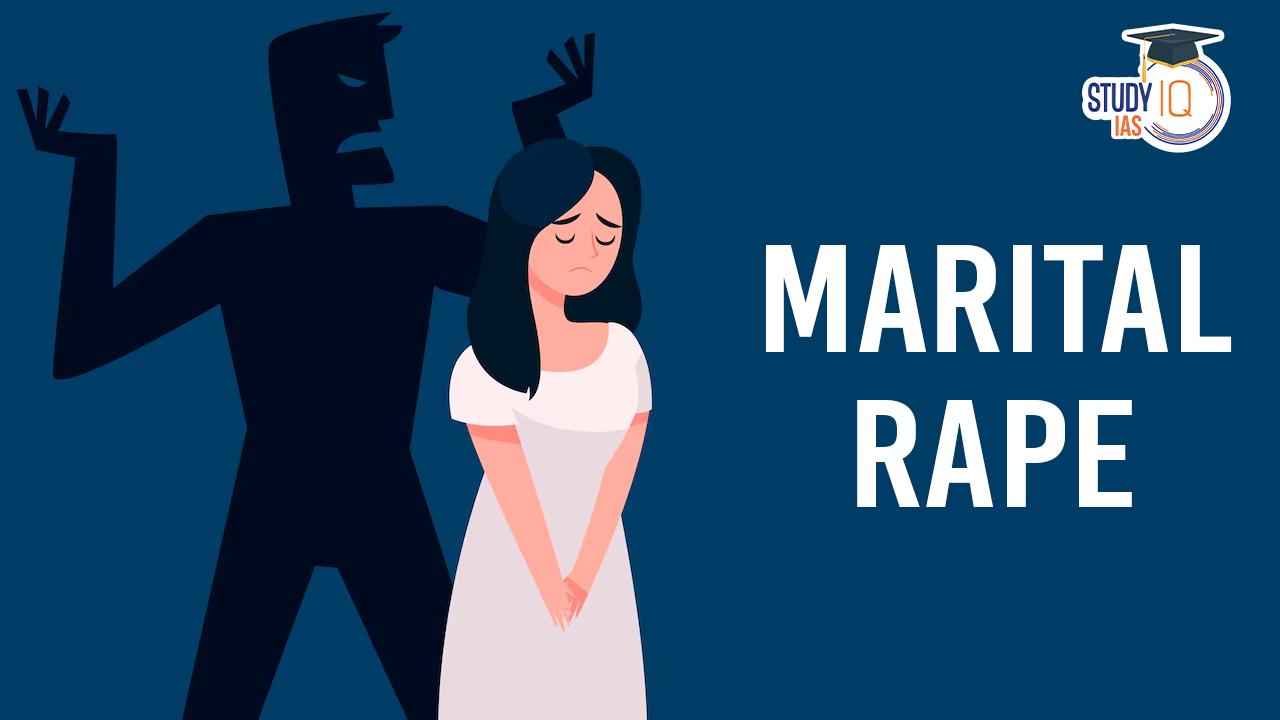Table of Contents
What Is Marital Rape?
Marital rape occurs when a spouse forces their partner into sexual intercourse without consent. It is a form of domestic violence and a violation of human rights, undermining the victim’s bodily autonomy, dignity, and integrity. In many countries, marital rape is treated as a criminal offense under rape laws, but India’s stance remains contentious.
Key Legal Provisions for Marital Rape
Section 375 of the IPC (Rape)
- It defines rape as sexual intercourse with a woman against her will, without her consent or under certain other circumstances.
- Exception 2 under Section -375 (IPC): It states that sexual intercourse between a husband and wife is not considered rape if the wife is over the age of 15.
- Changes under Bhartiya Nyaya Sanhita (BNS): It has retained the same exception under Section-63, but raised the age of the woman from 15 to 18.
Section 377 of the IPC (Unnatural Offences)
- This section criminalises “carnal intercourse against the order of nature with any man, woman, or animal,” originally aimed at criminalising homosexuality.
- It does not include the marital rape exception found in Section 375.
Chhattisgarh High Court’s Ruling Marital Rape
Interpretation of Marital Rape Exception
- The Court highlighted that Section 375 includes a marital rape exception, meaning non-consensual sex within marriage is not punishable as rape.
- Given this exception, the Court ruled that Section 377 could not be applied to non-consensual acts between married couples, as this would contradict the principle in Section 375.
Section 377 and Non-Consensual Acts
- The High Court noted that Section 377 continues to punish non-consensual “unnatural offences,” but, after the 2018 Supreme Court ruling decriminalising homosexuality, Section 377 only applies to non-consensual acts, such as bestiality.
- Therefore, the Court held that if unnatural sex occurs between consenting married partners, Section 377 does not apply, since it is not deemed an offence.
Implications of the Ruling ➡️ Loss of Legal Recourse for Married Women
- Previously married women who experience non-consensual sex used Section 377 to initiate prosecution for sexual acts without consent. After this ruling, they no longer have that recourse, as Section 377 is now also protected by the marital rape immunity.
Legal Status of Marital Rape in India
In India, the law governing rape is primarily outlined in Section 375 of the Indian Penal Code (IPC). According to this section, sexual intercourse without the woman’s consent constitutes rape. However, Exception 2 to Section 375 provides immunity to husbands by stating that sexual intercourse by a man with his own wife (provided she is not a minor) does not amount to rape.
This exception, in essence, legalizes non-consensual sex between married partners, creating a legal loophole that denies protection to wives against sexual assault by their husbands. While the Protection of Women from Domestic Violence Act, 2005 offers some civil remedies, including protection orders, it does not criminalize marital rape.
Ongoing Legal Battle in Supreme Court
India’s highest court, the Supreme Court, is currently examining the constitutionality of the marital rape exemption. In September 2024, the court made headlines by announcing that it would decide the matter based on legal principles, irrespective of the Centre’s silence on the issue.
Several public interest litigations (PILs), led by activists and women’s rights organizations, have challenged the constitutionality of the marital rape exception. These petitions argue that the exception violates the fundamental rights of married women, including their right to bodily autonomy, dignity, and equality under Article 14 and Article 21 of the Indian Constitution.
The case gained prominence after a split verdict by the Delhi High Court in May 2022. While Justice Rajiv Shakdher declared the marital rape exception unconstitutional, Justice C Hari Shankar upheld the law, stating that it did not violate any constitutional provisions. This divergence in opinion led to the matter being escalated to the Supreme Court for a final resolution.
Arguments For and Against Criminalizing Marital Rape
Arguments for Criminalizing Marital Rape
- Violation of Consent and Autonomy: Advocates for criminalizing marital rape argue that marriage should not undermine a woman’s right to consent. Sexual relations must be based on mutual consent, and any violation of that consent is a violation of bodily autonomy.
- Fundamental Rights: The marital rape exemption is viewed as a violation of Articles 14 and 21 of the Constitution. Women should not lose their rights to equality and personal liberty just because they are married.
- International Obligations: India has ratified several international conventions, such as the Convention on the Elimination of All Forms of Discrimination Against Women (CEDAW), which obliges countries to take measures to eliminate violence against women, including marital rape.
- Progressive Rulings: In 2017, the Supreme Court restricted the marital rape exemption to wives above the age of 18, reading down the law that previously applied to wives as young as 15 years old. In September 2022, the court ruled that forced sex by a husband can be considered rape under the Medical Termination of Pregnancy (MTP) Act, marking a significant step toward recognizing marital rape in specific contexts.
Arguments Against Criminalizing Marital Rape
- Social and Cultural Context: Opponents argue that criminalizing marital rape could disrupt the institution of marriage, which is deeply rooted in Indian society. They claim that the law could be misused to file false cases against husbands.
- Difficulty in Proving Marital Rape: Critics highlight the challenges of proving marital rape in court. Given the intimate nature of the crime, it could be challenging to establish evidence, leading to a potential misuse of the law.
- Government’s Stand: The Union government has repeatedly cited social ramifications as a reason for its hesitance to criminalize marital rape. It argues that such a law could destabilize marriages and have broader societal consequences, although these claims remain contentious.
Comparative Analysis: Marital Rape in Other Countries
Several countries have recognized and criminalized marital rape, offering legal protections to victims:
- United Kingdom: Marital rape was criminalized in the UK in 1991 after the landmark case of R v R, where the House of Lords ruled that a husband could be prosecuted for raping his wife.
- United States: All 50 states in the US have laws criminalizing marital rape, though the legislation was adopted at different times.
- Canada: Canada criminalized marital rape in 1983, affirming that consent is necessary within marriage for any sexual activity.
- Australia: Marital rape laws were implemented across all states by 1994, ensuring equal protection for married women against sexual assault.
In contrast, India’s ongoing reluctance to criminalize marital rape places it among
the countries that have yet to recognize spousal sexual violence as a criminal act, despite global advancements in gender rights and justice systems. This raises significant questions about India’s commitment to upholding women’s rights, particularly in the context of marriage.
Social Impact of Marital Rape
The lack of legal recognition for marital rape in India perpetuates a cycle of violence within households, affecting not only the immediate victims but also families, particularly children who may witness such abuse. According to numerous studies and reports, the non-criminalization of marital rape contributes to the normalization of spousal violence, undermining efforts to combat domestic abuse.
The National Family Health Survey (NFHS) and other data suggest that marital rape, while underreported, is widespread in India. Many women feel trapped due to societal norms, economic dependency, or the stigma associated with leaving abusive marriages. As a result, the absence of legal recourse leaves countless women without the ability to challenge the violence inflicted upon them.
Way Forward
The ongoing debate on marital rape in India underscores the urgent need for reform. Legal experts, activists, and international organizations have recommended the following measures to address the issue:
- Amendment to the IPC: Removing Exception 2 to Section 375 of the IPC is crucial to align Indian rape laws with international human rights standards. This would allow for the prosecution of marital rape and provide much-needed legal protection to married women.
- Public Awareness Campaigns: Educational campaigns should be launched to challenge traditional notions of marriage and consent. The idea that marriage equates to automatic sexual consent must be dismantled through awareness programs in both urban and rural areas.
- Comprehensive Support Systems: Victims of marital rape often face severe emotional and psychological trauma. Establishing comprehensive support systems, including counseling services, legal aid, and shelter homes, would empower survivors to seek justice and rebuild their lives.
- Judicial Sensitization: Judges and law enforcement agencies need to be sensitized to issues of marital rape and spousal sexual violence. Proper training would ensure that marital rape cases are handled with the seriousness they deserve, and that survivors receive justice in a timely and fair manner.
- Stronger Domestic Violence Laws: Strengthening existing domestic violence laws, such as the Protection of Women from Domestic Violence Act, could help address sexual violence within marriages until specific marital rape legislation is enacted.
Conclusion
Marital rape remains a contentious issue in India, where cultural, social, and legal barriers continue to obstruct justice for countless victims. The Supreme Court’s decision in the coming months will be pivotal in shaping the future of women’s rights in India, potentially bringing the country in line with international norms. Criminalizing marital rape is not just a legal necessity but also a moral imperative to ensure that every woman, married or otherwise, has the right to her bodily autonomy and consent.
Sharing is caring!


 New Phase of Operation Chakra to Combat ...
New Phase of Operation Chakra to Combat ...
 Soyuz Aircraft: History, Design and Sign...
Soyuz Aircraft: History, Design and Sign...
 Topological Materials: The Future of Qua...
Topological Materials: The Future of Qua...





















